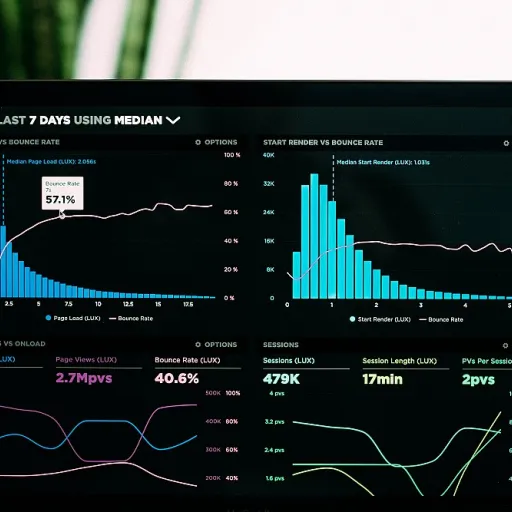
Understanding the basics of car dealer search engine optimization
Key Elements of Automotive SEO for Car Dealerships
Car dealerships face a unique set of challenges when it comes to search engine optimization. Unlike other industries, automotive SEO must address both national and local search intent, as car buyers often start their journey online before visiting a dealership. A strong digital marketing strategy ensures your dealership website stands out on Google and other search engines, helping you attract potential customers and drive more business.
- Local SEO: Optimizing your Google Business Profile and ensuring your dealership appears on Google Maps is crucial for reaching local car buyers. Accurate business information, positive reviews, and local citations help your site rank higher for searches like "car dealer near me."
- Website Structure: A well-organized site with clear internal links and structured data (schema markup) helps search engines understand your content. Automotive search relies on schema to display inventory, reviews, and business details directly in search results.
- Mobile Optimization: With most car buyers using mobile devices, your website must load quickly and provide a seamless experience. Google prioritizes mobile-friendly sites in its rankings.
- Content and Reviews: High-quality content tailored to car buyers’ needs, along with genuine customer reviews, builds trust and authority. This content should answer common questions, highlight dealership services, and showcase inventory.
- Digital Advertising and Marketing: Combining organic SEO with digital advertising can amplify your reach. Targeted ads and remarketing help you connect with customers at different stages of the buying process.
Automotive SEO is not just about keywords; it’s about creating a comprehensive online presence that guides customers from search to sale. As the digital landscape evolves, understanding the basics of engine optimization for car dealerships lays the foundation for more advanced strategies, including AI-driven enhancements, content generation, and performance analytics.
For dealerships looking to strengthen their digital marketing, establishing effective brand guidelines can help maintain consistency across all online channels, supporting both SEO and broader business goals.
How artificial intelligence enhances keyword research for car dealers
Smarter Keyword Discovery for Automotive SEO
Artificial intelligence is changing how car dealerships approach keyword research, making it more precise and effective. Traditional methods often relied on manual research and guesswork, but AI tools now analyze massive amounts of data from search engines, dealership websites, and customer queries. This helps identify high-value keywords that potential car buyers actually use when searching for vehicles or services online.
- Understanding user intent: AI can interpret the context behind search queries, so dealerships can target keywords that match what customers are really looking for, whether it's a specific car model, local dealership, or automotive service.
- Competitor analysis: AI-powered platforms scan competitor sites and automotive search trends, revealing gaps and opportunities for your own SEO strategy.
- Long-tail keyword suggestions: AI uncovers longer, more specific phrases that attract qualified leads, such as "best used SUVs near me" or "certified pre-owned car dealer in [city]."
Optimizing for Local and Mobile Search
With more customers searching for car dealerships on mobile devices and through local queries, AI helps identify keywords that improve local SEO. This includes optimizing for terms related to your business profile, Google Maps, and local automotive services. AI also helps refine schema markup and structured data, making your site more visible in local search results and digital advertising campaigns.
Integrating Data Sources for Better Results
AI-driven keyword research doesn't just rely on one source. It pulls data from multiple channels, including online reviews, digital marketing campaigns, and internal links within your website. This holistic approach ensures that your SEO strategy is aligned with what customers are searching for and how they interact with your site. For a deeper dive into how referral sources impact AI-driven SEO, check out this analysis of referral sources in AI-driven SEO.
By leveraging AI for keyword research, car dealers can stay ahead in the competitive automotive market, attract more potential customers, and improve their overall search engine optimization efforts.
AI-driven content creation for car dealership websites
AI-Powered Content Creation for Automotive SEO
Artificial intelligence is changing how car dealerships approach content creation for their websites. With the rise of digital marketing and the importance of local SEO, car dealers are turning to AI tools to generate high-quality, relevant content that appeals to both search engines and potential customers. This shift is helping dealerships stand out in a crowded automotive search landscape, especially on platforms like Google and Google Maps.
- Automated Content Generation: AI can help produce engaging blog posts, vehicle descriptions, and service pages tailored to the dealership's target audience. By analyzing search trends and customer queries, AI ensures that content addresses what car buyers are actually searching for online.
- Optimizing for Local and Mobile Search: AI tools can identify local keywords and phrases that boost visibility in local search results. This is crucial for car dealerships aiming to attract nearby customers who use mobile devices to find automotive businesses.
- Schema Markup and Structured Data: AI can assist in implementing schema markup, making it easier for search engines to understand dealership websites. Structured data enhances business profiles on Google, improves local SEO, and increases the chances of appearing in rich results, such as reviews or inventory listings.
- Internal Linking Strategies: AI analyzes site structure and suggests internal links that improve user navigation and help search engines crawl the website more effectively. This boosts overall engine optimization and keeps visitors engaged longer.
- Review and Reputation Management: AI-driven tools monitor and analyze online reviews, helping car dealers respond promptly and maintain a positive digital presence. This feedback loop not only improves trust but also signals to search engines that the business is active and customer-focused.
For car dealerships looking to build a robust digital advertising and automotive SEO strategy, leveraging AI in content creation is essential. It streamlines the process, ensures consistency, and aligns with best practices for online visibility. For a deeper dive into building an effective digital channel strategy with AI-powered SEO, check out this guide to AI-powered SEO strategies.
Personalization and user experience improvements with AI
Delivering Tailored Experiences for Car Buyers
AI is reshaping how car dealerships connect with potential customers by making websites more personal and relevant. When a user visits a dealership site, artificial intelligence can analyze their behavior—such as the cars they view, the content they read, and even their location. This allows the site to recommend vehicles, articles, or offers that match the visitor’s interests, increasing the chances of engagement and conversion.Enhancing Local SEO and Google Business Profiles
Personalization goes beyond just content. AI can optimize local SEO by ensuring that business profiles and Google Maps listings are up to date and reflect what local car buyers are searching for. For example, AI tools can monitor reviews and automatically highlight positive feedback on the dealership’s website, helping to build trust with new customers. They can also suggest updates to business hours, photos, and services, making the dealership more visible in local search results.Mobile-First Experiences and Structured Data
With more car buyers searching on mobile devices, AI helps dealerships create seamless mobile experiences. This includes optimizing site speed, navigation, and content layout for smartphones. AI can also implement structured data and schema markup, which helps search engines like Google better understand the dealership’s inventory, reviews, and business details. This can improve how listings appear in search results, attracting more clicks from potential customers.- AI-driven personalization increases user engagement by showing relevant vehicles and offers.
- Automated review management and business profile updates boost local SEO.
- Mobile optimization and schema markup help search engines display dealership information more effectively.
Advanced analytics and performance tracking using AI
Turning Data into Actionable Insights
Artificial intelligence is changing how car dealerships approach analytics and performance tracking in search engine optimization. With AI, businesses can process massive amounts of data from their website, Google Business Profile, reviews, and digital marketing campaigns. This helps dealerships understand what is working and where improvements are needed. AI-powered tools can automatically analyze search engine rankings, website traffic, and customer behavior. For example, they can identify which keywords bring the most potential customers to your site, or which pages keep car buyers engaged. This level of detail allows car dealers to adjust their automotive SEO strategies quickly, making sure their site stays competitive in local and automotive search results.Key Metrics and Automated Reporting
AI tools help track important metrics, such as:- Organic search traffic and trends
- Click-through rates from Google Maps and local search
- Performance of structured data and schema markup
- Customer reviews and sentiment analysis
- Mobile website usability and speed
- Effectiveness of internal links and content updates
Predictive Analytics for Better Decision-Making
AI doesn’t just report on what happened—it can predict what might happen next. By analyzing patterns in online behavior, digital advertising results, and automotive search trends, AI helps car dealers forecast demand and adjust their marketing strategies. This means dealerships can prepare for seasonal changes, shifts in car buyer preferences, or updates in search engine algorithms.Continuous Improvement for Automotive SEO
With AI, car dealerships can move beyond basic engine optimization. They can test new content, update schema, and improve their website structure based on real-time data. This ongoing process helps ensure their site remains visible to search engines and attractive to customers searching for cars online. By leveraging advanced analytics, dealerships can build a stronger digital presence and connect with more local car buyers.Challenges and ethical considerations in using AI for SEO
Potential Pitfalls of Automated Optimization
While artificial intelligence brings significant advantages to automotive SEO, it is not without risks. Over-reliance on automated tools for keyword research, content creation, or structured data can sometimes lead to generic or irrelevant content on a car dealership website. Search engines like Google prioritize unique, high-quality content that genuinely helps potential customers. If a dealership site uses AI-generated content without proper review, it may miss the mark on local relevance or fail to address specific car buyers' needs.
Transparency and Trust in Digital Marketing
AI-driven tools can help car dealers optimize their business profiles, manage reviews, and enhance local SEO. However, transparency is crucial. Automotive businesses must ensure that any content or reviews generated by AI are clearly disclosed and do not mislead customers. Search engines are increasingly sophisticated at detecting manipulative practices, and sites that violate guidelines risk penalties or loss of trust. Maintaining accurate business information, especially on platforms like Google Maps and Google Business, is essential for building credibility with both customers and search engines.
Bias and Fairness in AI Algorithms
Another challenge is the potential for bias in AI algorithms. If the data used to train these systems is skewed, the resulting recommendations for keywords, internal links, or digital advertising strategies may not reflect the diversity of car buyers or local markets. This can impact the effectiveness of automotive search campaigns and limit the reach to new customers. Regularly auditing AI-driven tools and ensuring diverse data sources can help mitigate these risks.
Data Privacy and Customer Protection
Personalization features powered by AI can improve user experience on car dealership websites, but they also raise concerns about data privacy. Collecting and analyzing customer data for digital marketing must comply with regulations and respect user consent. Dealerships should be transparent about how they use customer information, especially when leveraging schema markup or structured data to enhance search engine optimization.
Keeping Up with Evolving Search Engine Guidelines
Search engines frequently update their algorithms and guidelines, particularly around AI-generated content and digital advertising. Car dealers and automotive businesses must stay informed to ensure their SEO strategies remain effective and compliant. Relying solely on automated solutions without human oversight can result in outdated practices that harm online visibility or business reputation.
- Review all AI-generated content for accuracy and relevance before publishing on your website.
- Maintain transparency with customers about how AI is used in your digital marketing and business profile management.
- Regularly audit AI tools for bias and update data sources to reflect your local automotive market.
- Comply with privacy regulations when collecting and using customer data for personalization or analytics.
- Monitor updates from search engines to ensure ongoing compliance and optimal performance in automotive SEO.













